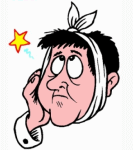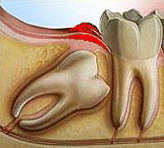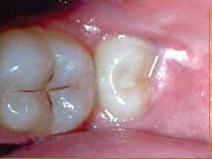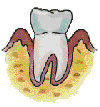
Wisdom Teeth Pain
Toothaches related to wisdom teeth problems are very common. Due to their position in the back of the jaw and their delayed eruption, wisdom teeth are considered as the more susceptible to dental problems than all other types of teeth. It is rare for someone not to face a wisdom tooth pain either when they erupt or later due to conditions related with them.
Causes of wisdom teeth pain
The 4 third-molars, which are what we call as wisdom teeth, are the last teeth at the back of the mouth, one at each side of each jaw behind the second molars.
Wisdom teeth related toothaches may arise from several different reasons. Wisdom teeth face not only the common dental problems as all other teeth, but also some specific conditions which can be responsible for severe wisdom teeth pain. The most common causes of toothaches of wisdom teeth include:
Wisdom teeth eruption pain
Wisdom teeth do not develop neither erupt at the same time with other permanent teeth but many years later, between 17 and 25 years of age. By this time the gums are much thicker than in the age of 12-13 years when the last of the other teeth erupt. Consequently the eruption of a wisdom tooth through the gums may cause one of the worst toothaches someone may experience through his life.
Swelling and pain in the cheek, jaw and adjacent teeth are common symptoms during the eruption of a wisdom tooth. Difficulty in chewing or opening the mouth wide are also common. Wisdom teeth pain and swelling may last between 7 to 15 days. Sometimes they erupt misaligned with the rest of the teeth, facing the wrong direction and causing irritation on the cheek, tongue, or other parts of the mouth.
Impacted wisdom teeth pain

Wisdom teeth eruption can be very painful even in the case when it is completed successfully, but things can become worse if something goes wrong. Many times the wisdom teeth fail to erupt and remain trapped in the jaw, fully or partially under the gums.
Since wisdom teeth are the last permanent teeth to grow, there is often not enough room left in the mouth for them to erupt properly. In this case they get stuck below the gum line usually leaning and pressing against the tooth in front. These impacted wisdom teeth will become the reason of severe pain sooner or later, either by causing damage to the adjacent tooth or by becoming infected and developing an abscess. The best solution recommended for preventing impacted wisdom teeth pain is their removal before they cause any problems.
Pericoronitis – Wisdom teeth infection pain

In some cases a wisdom tooth manages to erupt only partially, usually in an angle, with a part of its surface covered by a flap of gum tissue. Food particles, dental plaque and bacteria can become trapped under this gum flap and cause inflammation and infection of the gingival tissue. This condition, known as pericoronitis, is common among people who get an extraction due to wisdom tooth pain.
Difficulty to clean wisdom teeth – Oral hygiene issues
The wisdom teeth are positioned deep in the back of the mouth, in a place difficult to clean even for those who know well how to brush their teeth. Many people which have a gag reflex problem are purposely avoiding to brush their back teeth. If the wisdom tooth is partially impacted or crooked, cleaning well the bacterial plaque around it becomes even more difficult. The increased difficulty of successfully removing dental plaque from wisdom teeth, creates an elevated risk of developing gum disease and tooth decay.
Wisdom teeth extraction pain
If a wisdom tooth causes any of the above problems, the treatment recommended by dentists includes in most cases the extraction of the tooth. Due to their position, a wisdom tooth extraction is much more difficult than the removal of any other tooth. In many cases, and definitely for impacted teeth, they have to be surgically extracted from the jaw, by making an incision to the gums and possibly removing some of the jaw bone to release the tooth. A severe post-operative tooth pain should be expected for several days after the surgical removal of a wisdom tooth, usually accompanied with swelling. Over-the–counter or prescription tooth pain medicines can provide wisdom teeth extraction pain relief until the surgical area heals.
Another painful post-surgical condition, known as dry socket, may also occur if the blood clot from the extraction socket is lost exposing the bone. Following the post-operative instructions of your dentist can help minimize the wisdom tooth pain and reduce the risk of developing a dry socket.
Treatments for Wisdom Teeth Pain Relief
Wisdom teeth problems can become extremely painful. The following methods are the most common for providing pain relief for wisdom teeth:
- Ice Packs – Placing ice packs on the cheek close to the aching tooth can help reduce the toothache and the swelling, offering significant wisdom tooth pain relief.
- Saltwater Rinse - Rinsing the mouth with some warm water containing a couple of teaspoons of salt can provide some temporary relief.
- Tooth pain medication – Over-the-counter toothache medicines may be needed if the pain becomes more intense. The dentist will may also prescribe a stronger tooth pain medicine containing hydrocodone or oxycodone for managing severe pain after a surgical extraction of a wisdom tooth.
- Wisdom tooth extraction - Although dentists generally avoid extractions if a tooth can be saved by other dental treatments,
in the case of wisdom teeth they usually recommend the removal of the teeth if dental problems start to occur.
If the problems are caused by an impacted wisdom tooth, its surgical extraction is the only solution for preventing similar conditions in the future, protecting adjacent teeth and stopping wisdom teeth pain.
Many dentists suggest that wisdom teeth should be preventively extracted immediately after their eruption before they create any dental problems.
 The cost involved with dental treatments can be significant and many patients may not afford it if they are not covered by their dental insurance.
Learn how to choose a dental insurance plan that will provide the best dental treatment to you and your family.
The cost involved with dental treatments can be significant and many patients may not afford it if they are not covered by their dental insurance.
Learn how to choose a dental insurance plan that will provide the best dental treatment to you and your family.

 Sensitive Teeth Pain
Sensitive Teeth Pain Tooth Extraction Pain
Tooth Extraction Pain Toothache Medicines
Toothache Medicines